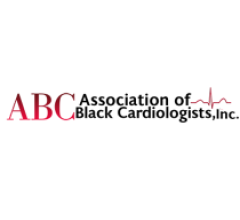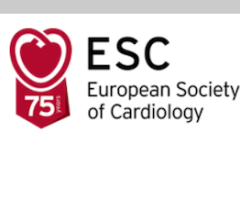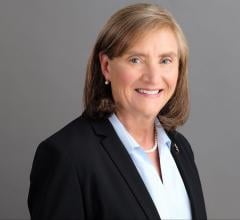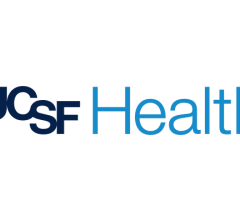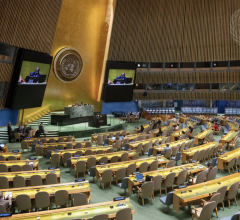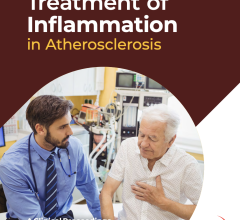
Findings from a global study conducted by the American College of Cardiology (ACC) reveal that more than 1 in 4 cardiologists experience self-reported mental health conditions, or MHCs. The report has been published in the February issue of the Journal of the American College of Cardiology, JACC. Photo credit: Getty Images.
February 23, 2023 — Findings from a global study conducted by the American College of Cardiology (ACC) reveal that more than 1 in 4 cardiologists experience self-reported mental health conditions, or MHCs. Further, authors noted that the association with adverse experiences in professional life is substantial, and dedicated efforts toward prevention and treatment are needed to maximize the contributions of affected cardiologists. Results of “Prevalence and Professional Impact of Mental Health Conditions Among Cardiologists,” a global online survey of nearly 6,000 cardiologists in 2019, have been published in the February issue of the Journal of American College of Cardiology (JACC).
Mental illness among physicians is an increasingly recognized concern, according to the researchers in their finding’s summary. Global data on mental health conditions (MHCs) among cardiologists are limited, which led the research team to its purpose in conducting the study: to investigate the global prevalence of MHCs among cardiologists and its relationships to professional life. Led by Sharma G, Rao S, Douglas P, et al., the authors (identified below), reported that the survey sought to further explore the global prevalence and differences in mental health conditions among cardiologists worldwide predictors of mental health conditions and the influence of mental health conditions on professional fulfillment. In this context, the American College of Cardiology conducted a 50-item online anonymous survey from September 13 to October 22 of 2019 with nearly 6000 cardiologists in Africa, Asia, Eastern Europe, European Union, Middle East Oceania in South Central and North America.
Key findings:
- Globally, 1 in 4 cardiologists experience any self-reported MHC, including psychological distress, or major or other psychiatric disorders.
- Nearly one-half of cardiologists reporting MHCs (44%) felt dissatisfied on at least one professional metric including feeling valued, treated fairly, and adequate compensation.
- There is significant geographic variation in MHCs, with highest and lowest prevalences in South America (39.3%) and Asia (20.1%) (P < 0.001).
- Predictors of MHCs included experiencing emotional harassment (OR: 2.81; 95% CI: 2.46-3.20), discrimination (OR: 1.85; 95% CI: 1.61-2.12), being divorced (OR: 1.85; 95% CI: 1.27-2.36), and age <55 years (OR: 1.43; 95% CI: 1.24-1.66).
- Women were more likely to consider suicide within the past 12 months (3.8% vs 2.3%), but were also more likely to seek help (42.3% vs 31.1%) as compared with men (all P < 0.001).
Work Environment in Focus
In discussion points, the authors wrote: “Beyond description, our data point to the predictors of MHCs and the intersectionality of hostile work environment and MHCs. Our data show that early career status, facing emotional harassment, and discrimination were all predictors of MHCs. Our data are unique because they explore the intersectionality of mental health among those who also experienced a hostile work environment, defined as a combination of discrimination and emotional and sexual harassment. We have previously reported that the presence of a hostile work environment in cardiology is high, with about 44% of cardiologists worldwide reporting some form of hostility at work. We found that, of the cardiologists who experienced a hostile work environment, almost one-half also reported having some MHC. These data need to be taken into context as we assess the chronic influence of working in psychologically unsafe environments and in a culture and climate where workplace toxicity is highly prevalent. The way women experience the health care system (hostile work environment) and the higher percentage of women among younger physicians at greater stress likely contribute to the higher prevalence of MHCs in our study, however, gender alone was not found to be a significant contributor of MHC on multivariate analysis.”
Calling for an Inclusive, Supportive Culture
The authors summarized the survey’s findings by noting: “This study reports the global prevalence and variations in MHCs among cardiologists worldwide, the predictors and protectors of MHCs, and the influence of MHCs on professional satisfaction. We highlight the need for the culture of cardiology to be more inclusive and supportive of those affected and encourage them to report their illness and seek treatment. Given the high prevalence of mental health disorders among cardiologists globally, dedicated efforts are needed, on an individual and organizational level, to reduce the causes of mental illness and to create a safe environment for those affected by MHCs.”
Authors of the paper include:
Garima Sharma, Ciccarone Center for the Prevention of Cardiovascular Disease, Johns Hopkins University School of Medicine, Department of Medicine, Johns Hopkins University School of Medicine, Baltimore, MD
Shiavax J. Rao, Department of Medicine, MedStar Union Memorial Hospital, Baltimore, MD
Pamela S. Douglas, Division of Cardiology, Duke University School of Medicine, Durham, NC
Anne Rzeszut, American College of Cardiology, Washington, DC
Dipti Itchhaporia, Division of Cardiology, University of California, Irvine, School of Medicine, Irvine, CA
Malissa J. Wood, Division of Cardiology, Massachusetts General Hospital, Harvard University, Boston, MA
Khurram Nasir, Division of Cardiovascular Prevention and Wellness, Department of Cardiology, Houston Methodist DeBakey Heart & Vascular Center, Houston, TX
Roger S. Blumenthal, Ciccarone Center for the Prevention of Cardiovascular Disease, Johns Hopkins University School of Medicine, Baltimore, MD
Athena Poppas, Division of Cardiology, Brown University, Providence, RI
Jeffrey Kuvin, Department of Cardiology at Northwell, Zucker School of Medicine, Hempstead, NY
Andrew P. Miller, CardioVascular Associates, Birmingham, AL
Roxana Mehran, Division of Cardiology, Ichan School of Medicine, Mount Sinai University, New York, NY
Michael Valentine, Division of Cardiology, Department of Medicine, University of Virginia, Charlottesville, VA
Richard F. Summers, Department of Psychiatry, Perelman School of Medicine, University of Pennsylvania, Philadelphia, PA
Laxmi S. Mehta, Division of Cardiology, The Ohio State University Wexner Medical Center, Columbus, OH
Ileana Piña, MD, MPH, served as Guest Associate Editor for this paper. Javed Butler, MD, MPH, MBA, served as Guest Editor-in-Chief for the paper.
JACC Editor-in-Chief Summary and Insights
In conjunction with the publication of JACC February 2023 issue, ACC offered a JACC Podcast providing key takeaways from the study. In the Feb. 14 segment, JACC Editor-in-Chief, Valentin Fuster, MD, PhD, MACC, focused on the findings and their impact to the cardiology community, and importance of the study moving forward.
Fuster serves The Mount Sinai Hospital as Physician-in-Chief, as well as Director of Mount Sinai Heart, the Zena and Michael A. Wiener Cardiovascular Institute and the Marie-Josée and Henry R. Kravis Center for Cardiovascular Health. He is also the Richard Gorlin, MD/Heart Research Foundation Professor, Icahn School of Medicine at Mount Sinai. Fuster was the President of Science and is now the General Director of the Centro Nacional de Investigaciones Cardiovasculares Carlos III (CNIC) in Madrid, Spain and also Chairman of the SHE Foundation (Science for Health and Education).
An excerpt from summary comments by JACC Editor-in Chief Fuster on what he noted was “an important paper” follows:
“Mental health conditions are now recognized as an area of significant concern in the practice of medicine. The issue is important because clinician wellbeing directly impacts patient care and productivity. And obviously, the issue is also important because we care about our mental health and the mental health mental health of our colleagues. The purpose as mentioned, was to investigate the global prevalence of mental health conditions among cardiologists and its relationships to professional life. According to the authors, more than one in four cardiologist experience self-reported mental health conditions globally, and the association with adverse experiences in professional life is substantial. They noted that dedicated efforts toward prevention and treatment are needed to maximize the contributions of affected cardiologists."
Fuster continued: "What can we do? First, we should selectively promote leaders who strive to mitigate implicit bias, discrimination and harassment, while advancing diversity, equity and inclusion within the broad range of cardiologists. Second, mentorship programs should be formalized to assist the cardiologists in transition zones from early to mid-career, with particular attention to women and those experiencing an increased load of family burdens, which compound existing workplace contributors to burn out in psychological distress…We may think this doesn't happen with our colleagues, in this case, cardiologists, but the reality is quite different. So let's be conscious that about one quarter of cardiologists around the world are somewhat in a struggle in terms of mental health conditions. Let’s be sensitive to ourselves and to our colleagues, and at least try to do the best we can in our cardiological environment. We should be sensitized, and act with the highest sensitivity to the problem presented to the in charge.”
Fuster acknowledged highlights of the editorial comment, provided by Andrew J. Sauer, MD, which accompanied the report’s findings. Sauer is a cardiologist and associate professor of cardiovascular medicine at Saint Luke’s Health System in Kansas City, MO.
For information: www.jacc.org
Reference:
Sharma G, Rao S, Douglas P, et al. Prevalence and Professional Impact of Mental Health Conditions Among Cardiologists. J Am Coll Cardiol. 2023 Feb, 81 (6) 574–586.https://doi.org/10.1016/j.jacc.2022.11.025
Sauer A, et al. Mental Health Conditions Among Cardiologists. J Am Coll Cardiol. 2023 Feb, 81 (6) 587–589. https://doi.org/10.1016/j.jacc.2022.11.026


 February 04, 2026
February 04, 2026 
